The Falklands thing was a fight between two bald men over a comb.
Jorge Luis Borges
Growing up in the 1980’s I spent a lot of time near a television set, like many kids my age. Every night at 6pm my parents would watch the news. At that age I didn’t pay a lot of attention. I was anxiously waiting for M.A.S.H or The A-Team – but it’s hard not to let some of those news stories imprint upon you, especially when they are repeated nightly. It was the tail end of the cold war – and one of the earliest stories I remember was the Falklands. It would be decades later before I understood anything about that conflict. I’m still not sure I really understand all that much, but it’s a bit of a strange one.
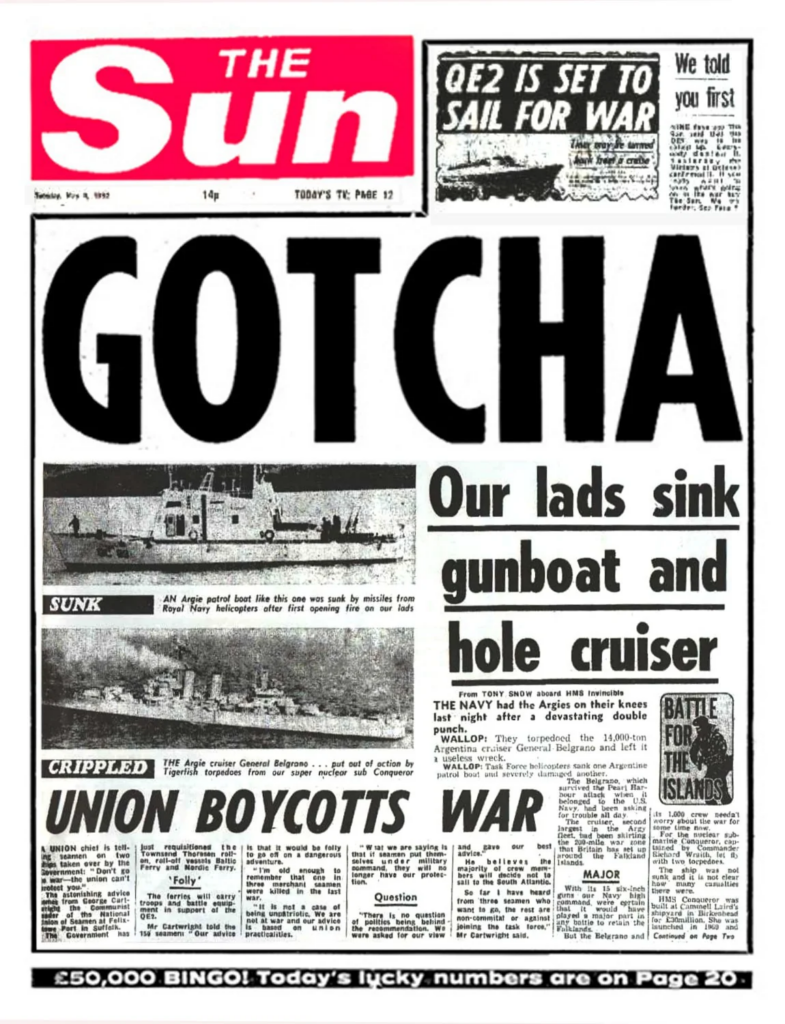
The Falklands War between Argentina and the United Kingdom that took place in 1982. It was triggered by the Argentine invasion and subsequent occupation of the Falkland Islands, South Georgia, and South Sandwich Islands, which are territories that had been under British control since the 19th century. In response to the invasion, the British government, led by then Prime Minister Margaret Thatcher, dispatched a task force to reclaim the territories.
After several weeks of fighting, the British forces were able to retake the Falkland Islands, leading to the surrender of the Argentine forces. The war lasted 74 days, resulted in the deaths of 649 Argentine and 255 British soldiers, and had significant political and diplomatic consequences for both countries. The conflict also brought attention to the issue of territorial claims in the South Atlantic. Even today, the Falkland Islands (known to Argentinians as Islas Malvinas) continue to be a source of tension between the United Kingdom and Argentina.
Mrs Thatcher’s War: The Falklands 1982 is a solitaire game published by White Dog Games in 2017, and designed by Ben Madison. It’s a strategic game that focuses on the air, sea, and land conflict on and around East Falkland and the mainland based Argentine forces. Despite being played out on two small paper maps, there’s a surprising amount of stuff going on. In all my discussions with folks who had previously played it – the word they typically choose to use is “challenging”.

The objective in Mrs. Thatcher’s War is to maintain air superiority during the first stages of the game while you wait for the British troops to land on the island and begin the ground invasion. Once that happens, on turn 7, your goal is to move your forces across East Falkland to hopefully surround and take Port Stanley, but you’ll have to deal with naval logistics, enemy ground forces, and perform pirouettes for air superiority in order to make that happen. For a solitaire game, there’s quite a bit going on.
When you crack open the game, the first thing you need to get comfortable with is the comprehensive sequence of play. This is honestly the core of the game, and the player aid for it is… detailed. It outlines all 10 steps of a turn, each containing between 3 and 9 steps of their own. There’s a Headlines step which has 22 events, some containing sub-events that you roll for. “Structured” doesn’t begin to describe it. After a couple of plays, I’m beginning to remember the major beats of the turn sequence, but I still regularly reference the rulebook for the anything that requires special steps or a special roll on a small chart. There’s actually a fan made Sequence Of Play card that’s even more detailed and helps to keep you out of the rulebook a little longer. You can find that over on BoardgameGeek.
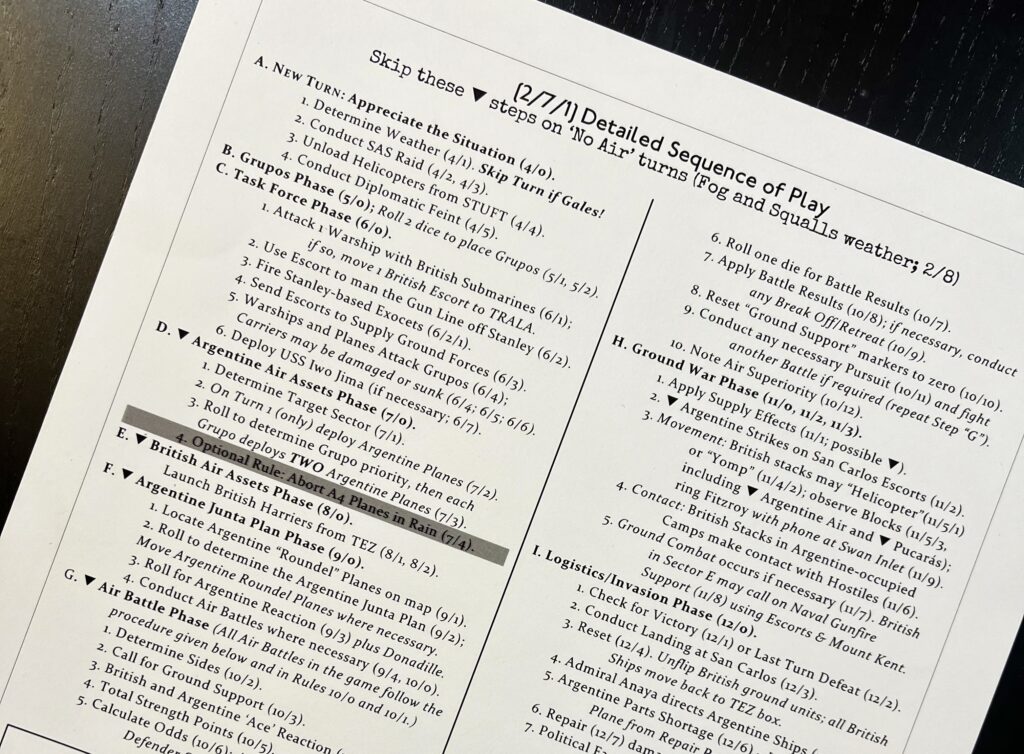
Like many solitaire wargames, Mrs. Thatcher’s War relies on these procedures to weave a narrative of the campaign. The turn sequence offers the player a wide variety of decisions along the way, compared to some lighter solo games. Sure, it essentially boils down to your management of three tracks leading into Stanley, but there are plenty of pitfalls and hazards thrown at you regularly, and its your job to navigate those on a day by day basis. You have to navigate Headlines that throw events at you. You have public opinion back home (in the form of a BBC News marker) to contend with. You may even have a visit from The Pope dampening your ability to wage war. Holy Mackerel!
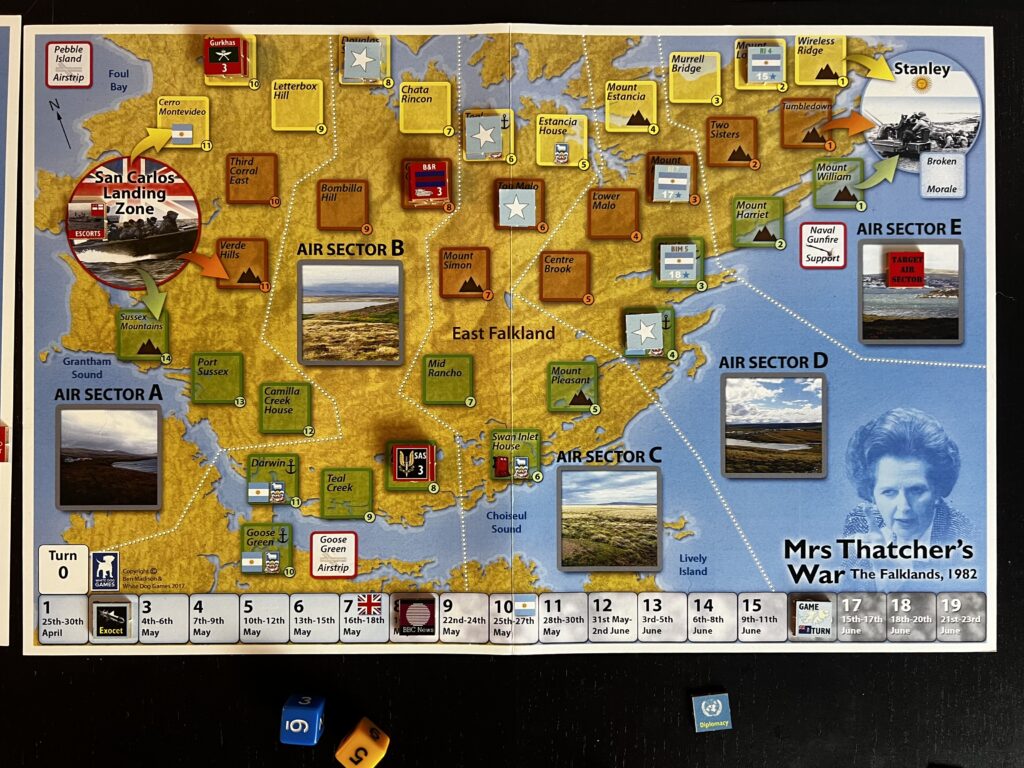
Each turn begins with the aptly named “Appreciate The Situation” phase, beginning with a die roll for determining the weather. Certain types of bad weather will prohibit air operations. If that happens, you skip everything on the turn sequence marked with ▼. If you roll “Gales” (which my dice seem to enjoy doing) you skip your turn entirely. The weather is just too perilous for your forces do anything. This is perhaps even more punishing than it sounds, because while a lot of your job is going to be managing your opponents in the air, at sea, and on the ground – your primary opponent is time.
From there you can conduct simple SAS Raids (special disruptive operations), before you are on to the Grupos phase. “Grupos” is the name given to the land-based air forces – essentially the units that enable the aircraft to take off. You roll two dice to place two of these randomly next to the numbered sea spaces. Now it’s the British Navy’s job to deal with these Grupos.
The Task Force phase allows you to use the British carriers Hermes and Invincible, as well as their escort units, to attack enemy warships if they’re around. They’ll also have the option to attack the Grupos, eliminating their ability to put fighters in the air.
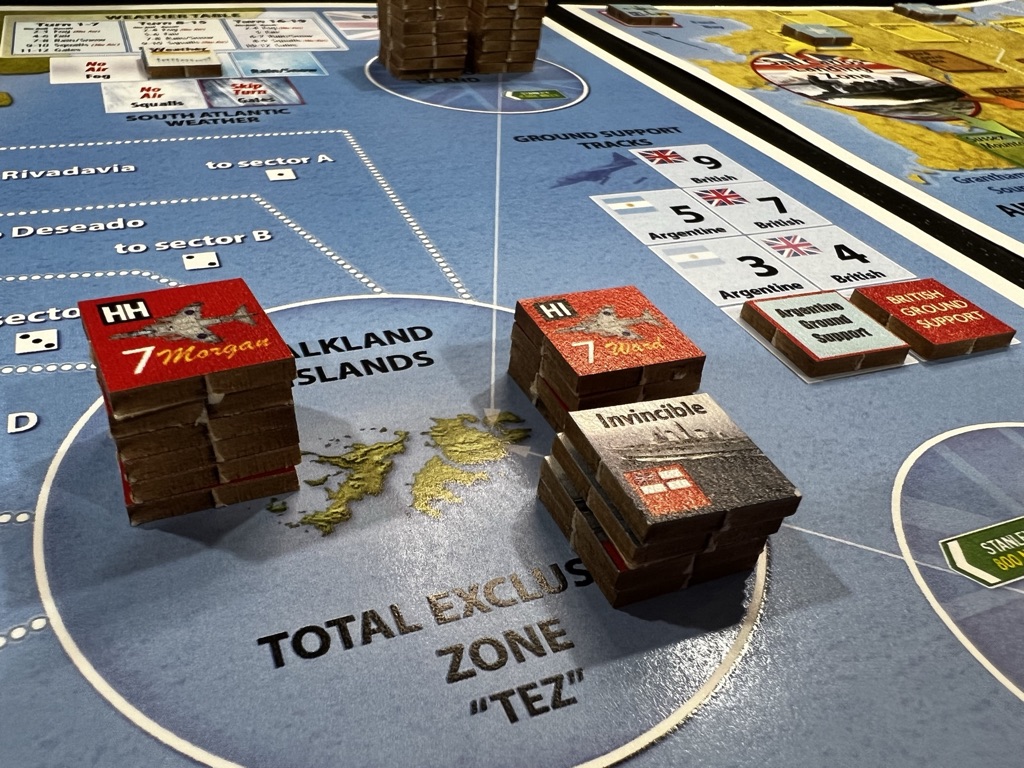
Next, you deploy the Argentine planes based on the remaining Grupos, and then determine if you’re going to send out the Harriers to intercept them over the island. Finally, before air combat actually begins, the Argentine Junta get to debate over which plan of action to follow, and their air forces will react accordingly.
Now the air battle phase commences, where you calculate the strength of planes in the sector and adjust based on the strength of any ground forces in that area, and resolve any ensuing combat. This is done against a combat results table and can sometimes result in cat and mouse style dogfights around the island. Eliminated aircraft are returned to a repair pool where they can slowly come back into service in ensuing turns.
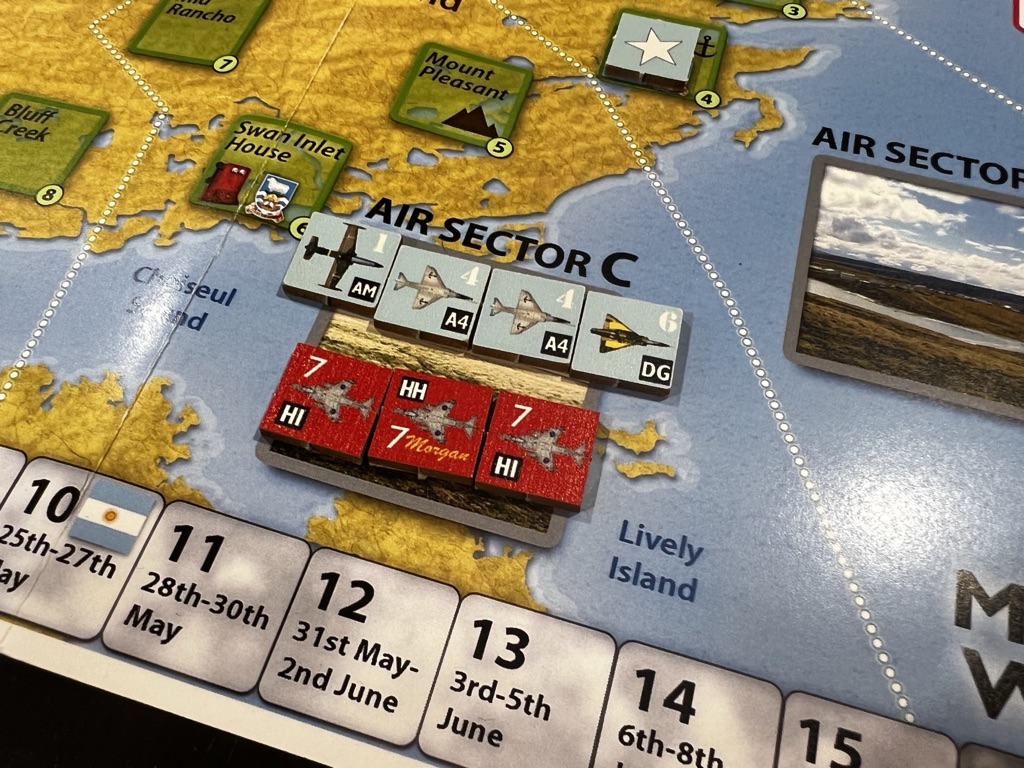
Next comes the ground war phase. This whole phase is skipped for the first seven turns, but at that point the British forces are able to land at San Carlos (if the weather is appropriate and you have the escorts available). Now the game is afoot.
Brezhnev took Afghanistan. Begin took Beirut. Galtieri took the Union Jack. And Maggie, over lunch one day, Took a cruiser with all hands. Apparently, to make him give it backPink Floyd (The Final Cut)
Your first decision is how to split up your forces. There are three paths across the island and for each you will create a stack. This stack will never deviate from their path, though they could be supplemented later on by the Scots Guards, Welsh Guards, or the fearsome Gurkhas. Now they must move across the island, inexorably yomping toward Stanley. If they can surround Stanley, that will constitute victory.
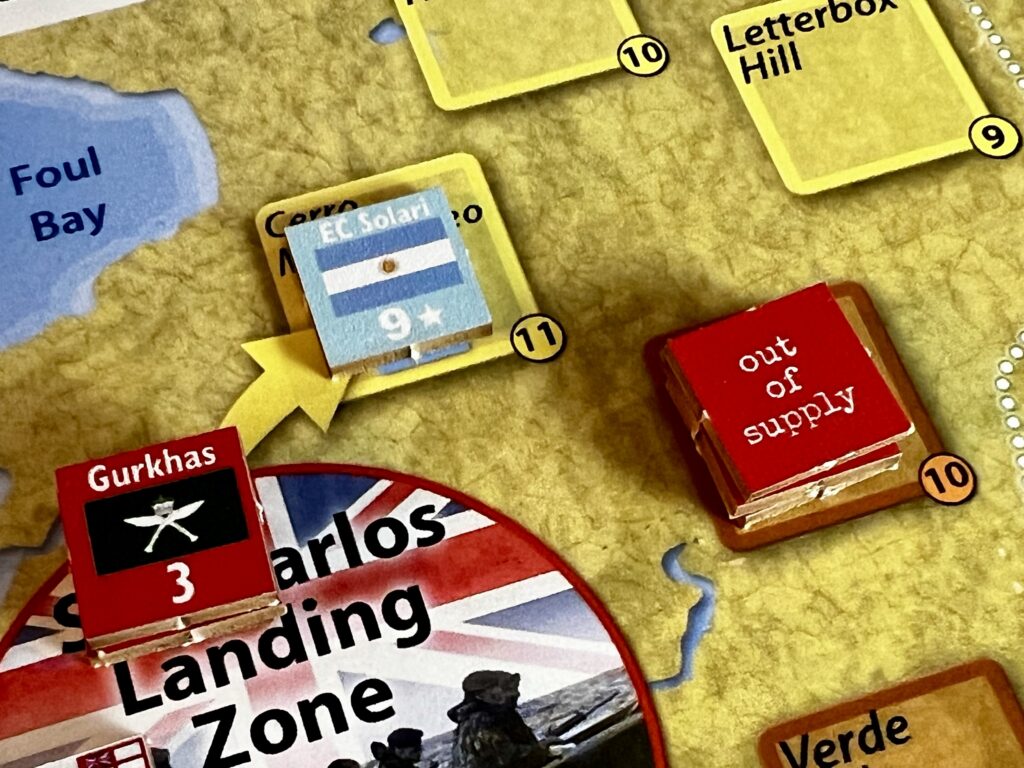
Yomping? That was new to me, too. It’s a term that was popularized by the marines during this particular engagement, and it stood for “Your Own Marching Pace”. It’s a word with great onomatopoeia, evoking the gruelling trudge of soldiers across wet peat and rocky crags. Yomping isn’t the only way for the troops to get to Stanley, however. They can also use helicopters to hasten their approach, provided those don’t get shot down by Argentine Exocet missiles.
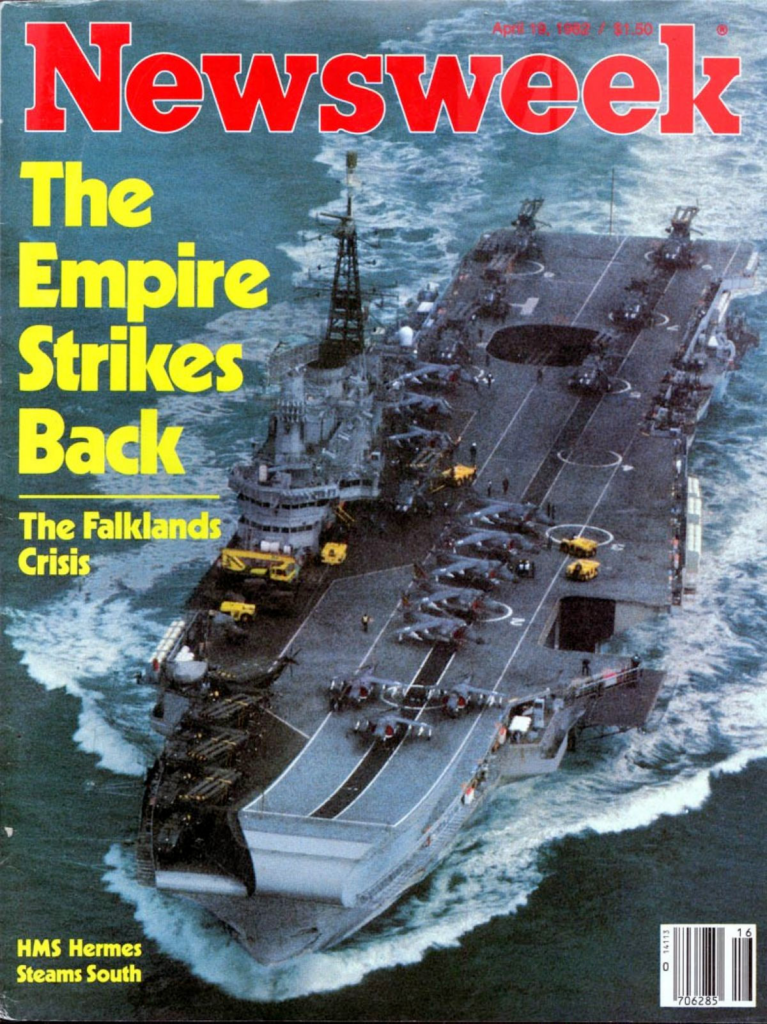
No matter how they do it, they’re going to encounter resistance along the way, in the form of mine fields, patrols, and combat units. They’ll have to manage this whilst under bombardment by the Argentine air force, unless you have air superiority in the sector. The Combat in Mrs. Thatcher’s War is pretty straightforward. You add up your counters strength, combat modifiers (weather, air superiority, and the presence of certain markers political on the turn track), and then add a single d6 die roll. The higher result wins the fight. If that was the Argentinians, it’s bad press back home (-5 for BBC News) and your forces are pushed back. If the British win, it’s good press (+3-5 for BBC News), and an opportunity to continue forward along the path. Public opinion is a big factor here.
During a short logistics phase where everything is reset and repairs are handled, you also determine if there’s a victory or loss condition achieved. If you can’t complete the objective of surrounding Stanley by Turn 19, the Brits lose, and the future of the island end up in the hands of the UN. If you can surround Stanley, you win! But, do you?
In November 2023 Argentina elected a new right-wing president named Javier Milei. Milei has stated that his government would “make every effort” to take the islands back “through diplomatic channels”, while UK Prime Minister Rishi Sunak has responded that there is “no doubt” the Falkland Islands are British, and that “the issue that was settled decisively some time ago”. Downing Street often cites a 2013 referendum that saw close to 100% of voters on the islands, which has a population of about 3,500 people, choose to remain a UK Overseas Territory, but that doesn’t seem convincing to the current Argentine government. It’s clear that this issue remains open and divisive, with tough posturing on both sides more than 40 years after the end of the war.
Ben Madison, the designer of Mrs. Thatcher’s War, seems to have clear opinions about the Falklands and they do shine through here. What’s clear to me is that sheer geography alone cannot be the deciding factor. It’s a complicated affair, and while I may be no closer to forming an opinion about the sovereignty of the islands, I am a few baby steps closer to understanding how this particular conflict transpired.
I’ve played Mrs. Thatcher’s War four times now, and I haven’t won it. There are so many punishing possibilities peppered around every bend that it’s statistically impossible to avoid them all. All you can do is try to navigate these hazards as best you can. I enjoy that kind of challenge though. I feel like victory is just out of reach – but if I try a tiny bit harder and get just a little luckier with a couple of roles, my next attempt might just succeed. That’s the kind of solitaire challenge I enjoy.


I first heard of yomping at Quantico in 1985. There was a contingent of Royal Marines training with us (actually, training us) who were Falkland veterans. Great guys. I recall their elan and british aplomb to this day.